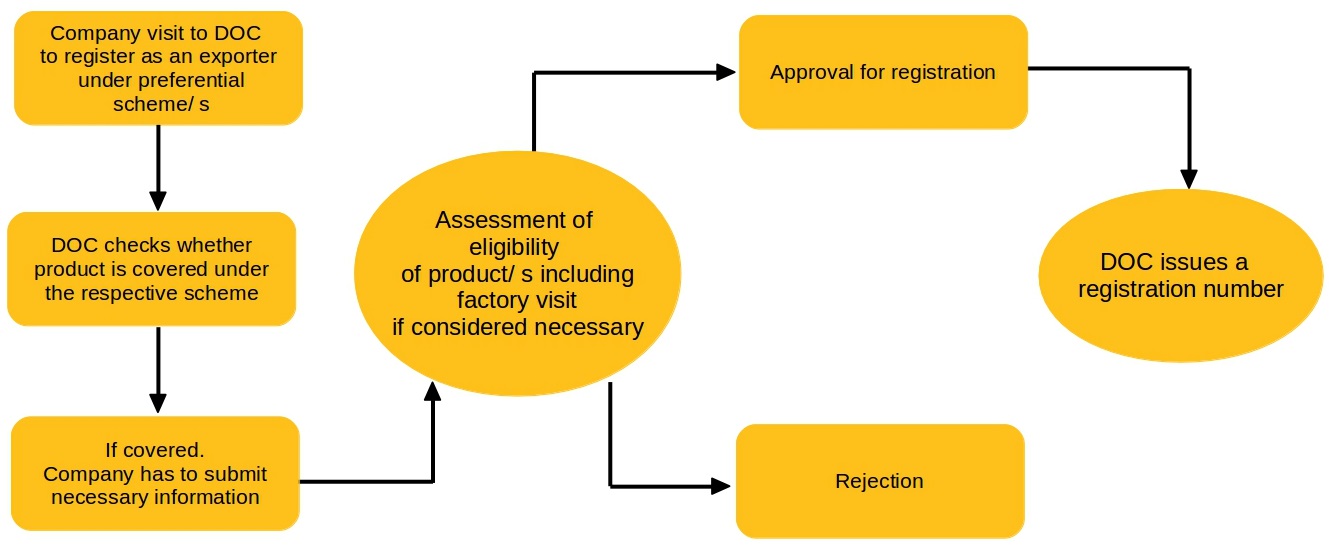DOC Issuance of Certificate of Origin Sri Lanka : Department of Commerce
Organisation : Department of Commerce (DOC)
Facility Name : Issuance of Certificate of Origin
Applicable Country : Sri Lanka
Website : doc [dot] gov [dot] lk
| Want to comment on this post? Go to bottom of this page. |
|---|
What is a Certificate of Origin?
It is an international trade document which certifies that goods that an exporter is shipping are originating in the exporter’s country. A product is considered originating if it is wholly obtained in a country, or produced, manufactured or processed in the exporting country with sufficient local value addition.
Related / Similar Facility : DOC Recommendation of Residence Visa Sri Lanka

Certificates of origin can be classified into two types: preferential and non-preferential. A preferential certificate of origin is issued confirming the origin of goods in a particular shipment according to a particular trade agreement. When presented to the importing country’s Customs authorities, the accompanying goods can enter the market duty free or with preferential duties, depending on the Agreement. This COO is issued by the Department of Commerce.
Non-preferential certificates of origin are issued where importing countries request an origin document for reasons other than giving duty waivers. This may be statistical purposes, health or technical standards, or where certain countries are facing increased punitive duties, to differentiate between those countries. No duty preferences attach to this type of certificated. Non-preferential COOs are issued by the Chambers of Commerce.
How To Obtain Certificate of Origin?
First, companies need to get registered in the Department of Commerce as an exporter after getting confirmation from the Department on eligibility of the product (see below for more details). This is a one-time registration.
Once the Registration is complete, then companies should apply for approval of certain standard documents which confirm that their products are eligible and meet the rules of origin. These documents are cost statements, affidavits or material sheets depending on the product and the applicable rules of origin. Once approved, these documents will be valid for six months to one year. Companies should then apply for a COO for each shipment.

FAQ On Certificate of Origin
Frequently Asked Questions FAQ On Certificate of Origin
For which countries can I apply for COOs?
** All SAARC countries under the ISFTA, PSFTA, SAFTA
** China, India, Korea, Bangladesh and Laos under the APTA Trade Agreements.
** Forty-two countries under the GSTP Agreement, namely Algeria, Argentina, Bangladesh, Benin, Bolivia, Brazil, Cameroon, Chile, Cuba, the Democratic People’s Republic of Korea, Ecuador, Egypt, Ghana, Guinea, Guyana, India, Indonesia, the Islamic Republic of Iran, Iraq, Libya, Malaysia, Mexico, Morocco, Mozambique, Myanmar, Nicaragua, Nigeria, Pakistan, Peru, Philippines, Republic of Korea, Singapore, Sri Lanka, Sudan, Thailand, Trinidad and Tobago, Tunisia, the United Republic of Tanzania, Venezuela, Viet Nam, Zimbabwe, and Mercosur.
** COOs are also available for the following countries which provide unilateral preferences to Sri Lanka: Australia, Canada, Japan, New Zealand, Norway, Eurasian Economic Commission countries (Armenia, Belarus, Kazakhstan, Kyrgyzstan, and Russia), US and Japan under the various GSP Agreements
** In addition, EU, Norway, Switzerland and Turkey also provide preferences under the GSP arrangements, but these benefits are obtainable under the self-declaration system known as REX
How do I check whether my product qualifies for the required rule of origin?
An exporter can formally apply for a determination on its product by submitting cost statements, affidavits, material sheets, for review and approval. An exporter can also seek the assistance of the Department on rules of origin, whether their product meets the rules of origin, advice on the production process and imported materials, through informal consultations prior to submitting documents for approval
How do I check whether my product qualifies for concessions?
Exporters can search for eligibility of the products through the list of eligible products given in the Department website under each relevant trade Agreement. Alternatively, exporters can call and request the assistance of the COO Division of the Department to see whether their products are eligible.In addition, exporters may refer the external or may use the Market Access tool maintained by the International Trade Center at the following: www.macmap.org.
If my product is not eligible under the preferential trade agreement, then how can I apply for a CoO?
Exporters can apply for a non- preferential CoO through the Chambers of Commerce. Ex: National Chamber of Commerce, Ceylon Chamber of Commerce, etc.
When should I contact DoC with respect to any problems clearing my shipment?
The exporter can contact the DoC if there is a problem relating to clearing a shipment, when such problem arises as a result of the COO, such as verification issue, non-acceptance, by the Customs of the importing authority.The Department will try to assist the exporter as much as possible to clear the shipment, in consultation with the Customs authorities, or through verification letters, or through consultation with Sri Lanka Missions in the importing country.